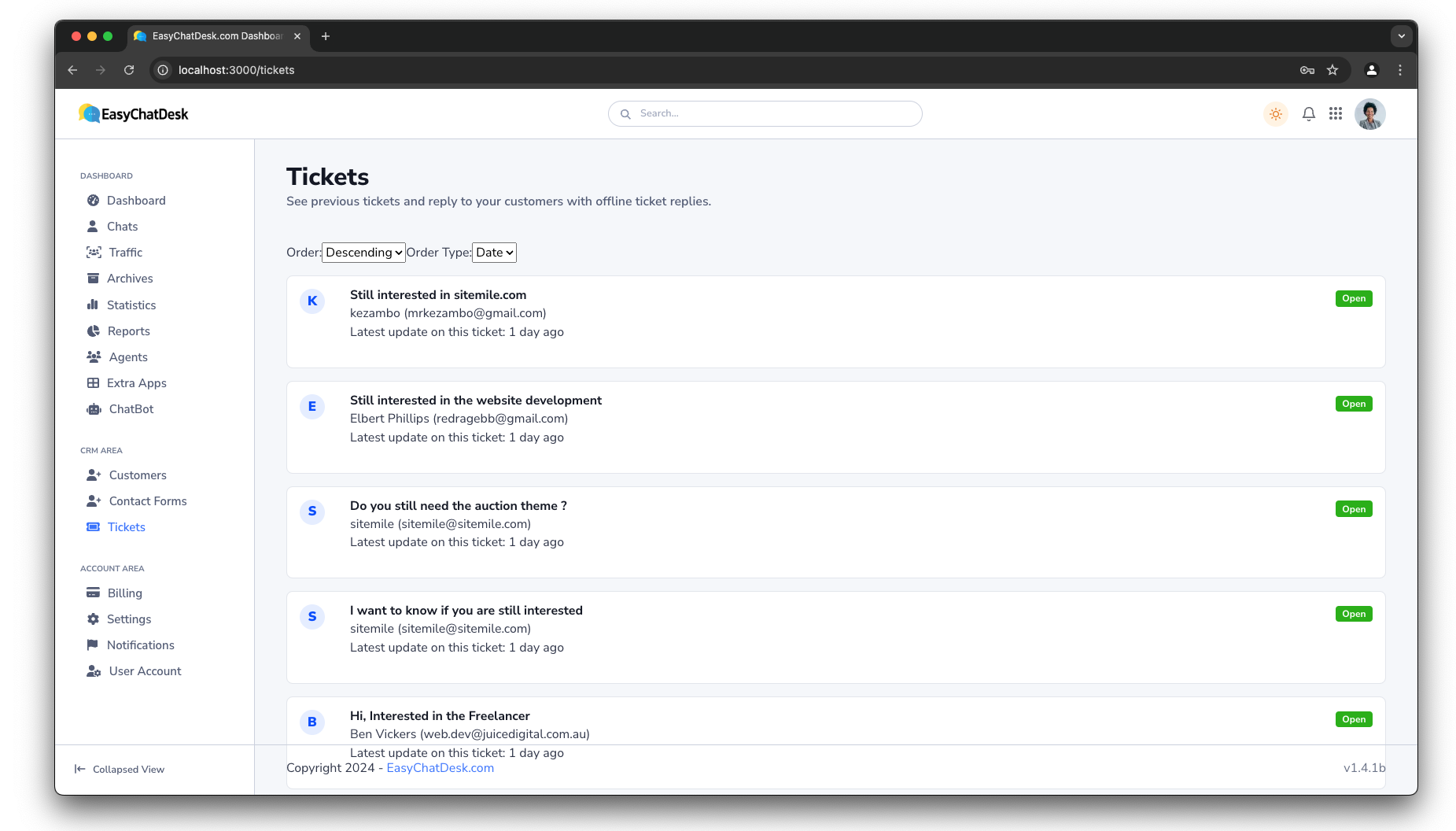Introduction to CRM Ticketing Systems
CRM (Customer Relationship Management) ticketing systems are increasingly becoming a vital component in modern business operations. They represent a fusion of technology and customer service, designed to streamline the process of managing customer interactions and support requests. In today’s fast-paced business environment, these systems play a crucial role in ensuring that customer needs are addressed efficiently and effectively.
By integrating various aspects of customer service into a unified platform, CRM ticketing systems help businesses maintain high levels of customer satisfaction and loyalty, which are essential for long-term success. By the way, easychatdesk offers a way to manage your potential customers with an intelligent crm client management system alongside with the chat tool, ticketing tool and other tools.

Get a free CRM Ticketing System today. Signup for a free account now.
Understanding CRM Ticketing Systems
Definition and Core Components
CRM ticketing systems are specialized software solutions that manage customer service requests and issues. At their core, these systems function by creating a ‘ticket’ for each customer interaction, whether it’s a query, complaint, or request. These tickets are then tracked, categorized, and resolved within the system. Essential components include a user-friendly interface for support agents, tools for ticket categorization and prioritization, and a database for storing customer information and interaction history. This setup ensures a structured approach to handling customer interactions.
How CRM Ticketing Integrates with Customer Relationship Management
The integration of ticketing systems with broader CRM strategies is a key aspect of modern customer service. These systems go beyond mere ticket handling; they provide valuable insights into customer behavior, preferences, and satisfaction levels. By collecting and analyzing data from every customer interaction, CRM ticketing systems enable businesses to personalize their service, anticipate customer needs, and build stronger relationships. This integration results in a more cohesive, data-driven approach to customer relationship management, aligning customer service closely with overall business objectives.
Benefits of Using CRM Ticketing Systems
Enhancing Customer Service and Support
CRM ticketing systems significantly enhance customer service and support. By providing a central repository for all customer interactions, they ensure that no customer query goes unanswered or forgotten. This systematic approach to ticket management leads to quicker response times and more consistent, high-quality customer support. The ability to track and analyze interactions also allows for continuous improvement in service strategies, directly contributing to higher levels of customer satisfaction.
Streamlining Communication and Workflow
Another major benefit of CRM ticketing systems is the streamlining of communication and workflow. These systems centralize all customer interactions, making it easier for support teams to access and share information. This centralized communication eliminates the silos often found in traditional customer service models, fostering better collaboration among team members. Furthermore, the automation features in these systems reduce manual tasks, allowing support staff to focus on more complex, value-added activities. This streamlined workflow not only improves operational efficiency but also enhances the overall customer experience.
Implementing a CRM Ticketing System in Your Business
Key Considerations for Implementation
When implementing a CRM ticketing system, several key factors must be considered to ensure a successful integration. First, understanding the specific needs of your business and how the system will address them is crucial. This involves evaluating the scale of your customer service operations and the complexity of the queries handled. Another critical factor is ensuring compatibility with existing IT infrastructure to facilitate a smooth integration. Additionally, considering the user-friendliness of the system is important, as it directly impacts the adoption rate among your staff. Finally, planning for data migration and system customization to align with your business processes is essential for a seamless transition.
Cost is also a significant consideration, including both the initial investment and the long-term operational costs. Choosing a system that offers scalability and flexibility to grow with your business needs is important to maximize return on investment. Moreover, considering the vendor’s support and training services can greatly influence the effectiveness and longevity of the system in your business operations.
Best Practices for Maximizing System Efficiency
To maximize the efficiency of a CRM ticketing system, it is essential to adopt best practices. Comprehensive training for all users is crucial to ensure they are proficient in using the system and can leverage its full capabilities. Regularly updating the system and utilizing its latest features can significantly enhance performance and efficiency. Additionally, it’s important to encourage feedback from your team and customers, as this can provide valuable insights for further system optimization.
Another best practice is to integrate the CRM ticketing system with other business tools and platforms. This integration provides a more holistic view of customer interactions across different channels and departments, leading to better-informed decisions and a more unified customer service approach. Finally, routinely analyzing the data and reports generated by the system can reveal trends and areas for improvement, enabling continuous refinement of customer service strategies and processes.
Conclusion
In conclusion, CRM ticketing systems have become an indispensable tool in contemporary business environments. Their ability to streamline customer service processes, enhance customer experience, and provide valuable insights into customer interactions makes them a key component in effective customer relationship management. As businesses continue to navigate the complexities of customer service in the digital age, CRM ticketing systems stand out as essential solutions for maintaining competitive advantage and fostering strong, lasting customer relationships.